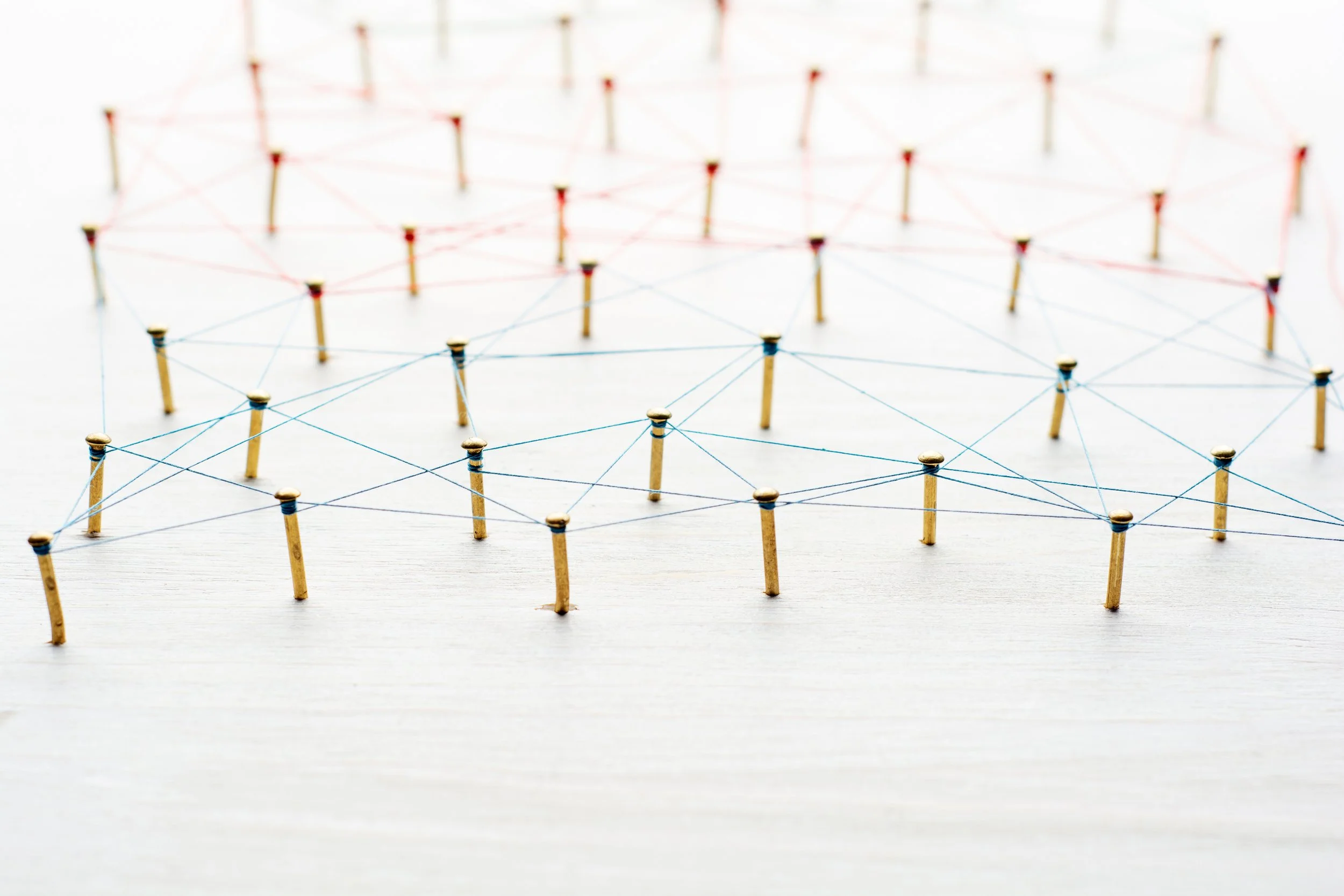How to recognize and break the patterns of unhealthy relationships
An article by Liz Vossen
Maya sat in her car after another exhausting dinner with her partner, feeling that familiar knot in her stomach. She'd spent the entire evening carefully choosing her words, monitoring his mood, and swallowing her own opinions to avoid conflict. As she replayed the night, a troubling thought emerged: this felt exactly like dinners with her ex from three years ago. And before that, her college boyfriend. Different people, same walking-on-eggshells feeling. Maya was beginning to recognize something she'd never wanted to admit—she wasn't just unlucky in love; she was caught in a pattern.
Relationships can be a source of comfort, growth, and connection. They can also be a source of repeated frustration, exhaustion, and pain.
Many people find themselves drawn into familiar cycles with romantic partners, close friends, or family members that leave them feeling stuck. Sometimes the pattern is so subtle it only becomes clear after years of repeating the same thing. Recognizing the unhealthy patterns is the first step toward changing them.
What makes a relationship “unhealthy”?
This is a tough question. An unhealthy relationship isn’t always about obvious conflict or abuse. It often shows up in the small, recurring ways we feel dismissed, controlled, or unsupported, such as:
Taking responsibility for someone else’s emotions or reactions
Walking on eggshells to avoid upsetting them
Giving more than you receive on a regular basis
Having your opinions or feelings dismissed or minimized
Dismissing your own boundaries to keep the peace
Being criticized or belittled in ways that chip away at your confidence
Feeling isolated because the relationship limits your independence or outside connections
Feeling anxious about expressing your needs
Staying in situations that leave you feeling depleted
The pattern is not defined by one big disagreement but rather by a long-term imbalance that leaves you feeling drained instead of feeling nourished.
Why we repeat unhealthy cycles
Our relationship patterns, especially bad ones, often come from learned experience. If you grew up in an environment where love was tied to sacrifice, conflict, or unpredictability, it may feel “normal” to repeat the same dynamics as adults. Our brains are drawn to the familiar, even when and if the familiar is painful.
Attachment styles, early family roles, and past trauma can all shape how we connect. Without awareness, these influences can quietly guide who we choose and how we behave in relationships. Recognizing this influence is not about blaming someone but rather about understanding why certain patterns feel so hard to break. Like with all change, awareness is the first critical step.
Signs you may be caught in an unhealthy relationship cycles
Some questions you can ask yourself are:
Do your relationships often follow the same script, even with different people?
Do you feel anxious or guilty when you think about setting boundaries?
Is there a repeated sense of being unseen, undervalued, or controlled?
Do you find yourself staying in situations that hurt, but hoping they will improve?
If your answer is yes to many of these, it may point to a cycle that needs attention.
Breaking the cycle of unhealthy relationships
Change takes intention and practice. Some steps that help include:
Build awareness
Journaling or talking with a trusted friend can help identify what repeats across your relationships. Awareness reduces the “autopilot” effect.Name your needs
Many people in unhealthy dynamics struggle to voice what they actually want. Start by writing them down privately. Clarity is the foundation of healthy connection.Experiment with boundaries
Boundaries don’t have to be confrontational. They are simply ways of protecting your well-being. Even small limits, like taking more personal time or saying no, can shift the balance.Challenge the belief that this is “all you deserve”
Patterns often persist because of internalized beliefs about worth. Counselling, support groups, or self-reflection can help reshape these stories.Seek relationships that model something different
Surround yourself with people who show respect, kindness, and balance. New experiences can teach your brain and body what healthy connection feels like.
When to reach out for help
Recognizing patterns is powerful, but breaking them is rarely easy. If you find yourself returning to harmful dynamics despite your best efforts, outside support can make a difference. Counselling offers a safe space to explore what keeps the cycle in place, practice healthier strategies, and strengthen your sense of self in relationships.
Moving toward healthier connections
No relationship is perfect, but healthy ones share core qualities: respect, safety, mutual support, and space for individuality. By becoming aware of unhealthy cycles and slowly changing how you engage, you give yourself a chance to build connections that lift you up instead of wear you down.
What you can do for yourself outside the relationship
Healing isn’t only about what happens between you and another person. It also involves how you treat yourself. Some individual steps that help include:
Strengthen your sense of self: Spend time on activities, hobbies, and friendships that remind you who you are outside of the relationship.
Practice self-reflection: Journaling can uncover repeated themes and bring clarity about what you truly need.
Challenge limiting beliefs: Notice thoughts like “this is all I deserve” or “things will never change.” These beliefs often keep unhealthy patterns in place.
Invest in your support system: Surround yourself with people who respect your boundaries and model healthy connection.
The stronger your individual foundation, the easier it becomes to step away from cycles that no longer serve you.
How counselling can help
Breaking entrenched patterns often requires more than willpower. Counselling provides a structured and supportive space to understand why certain dynamics feel familiar, and why breaking away from them can feel so difficult.
A therapist can help you:
Identify hidden beliefs that keep you tied to unhealthy dynamics
Explore the role of past experiences in shaping current choices
Learn concrete boundary-setting skills and communication strategies
Build confidence in expressing your needs without guilt
Develop healthier ways of relating that you can bring into new or existing relationships
Counselling is not about telling you to leave or stay. It is about equipping you with the clarity, skills, and self-worth to make choices that align with your well-being.
Six months later, Maya noticed something different as she prepared for a date. Instead of mentally rehearsing how to be the "perfect" partner, she found herself curious about who this person really was and whether they'd be a good fit for her life. She'd started setting small boundaries, expressing preferences about restaurants, sharing her actual opinions about movies, taking time for her weekly art class even when partners wanted to monopolize her evenings. The anxious knot in her stomach had been replaced by something she'd almost forgotten: excitement about genuine connection. Her relationship patterns hadn't disappeared overnight, but with her counselor's support, Maya was finally learning to choose differently.
About the author: Liz Vossen, M.Sc.
Liz Vossen knows that recognizing unhealthy relationship patterns is often easier than breaking them. Through her own journey of learning to identify patterns, clarify needs, set boundaries and choose differently, combined with her therapeutic training, she helps clients move from exhausting cycles of people-pleasing, walking on eggshells, or feeling consistently undervalued. Her work focuses on building awareness, strengthening your sense of self, and developing the confidence to create connections that actually nourish you. If you're ready to stop settling for relationships that drain your energy and start building ones that lift you up, she's here to guide that transformation.
How we can help you with affordable counselling
We work with individuals everyday that find themselves trapped in challenging recurring patterns, its part of being human, and the relationships we build are no different. Our counselling is designed to be supportive, accessible, and affordable. We use sliding scale prices based on your individual resources to provide low-cost counselling that is accessible to everyone.
If you’re interested in learning more, we encourage you to book a free introduction call with no obligations. Here we can answer questions, get to know each other better, and start building a plan to break bad habits.


